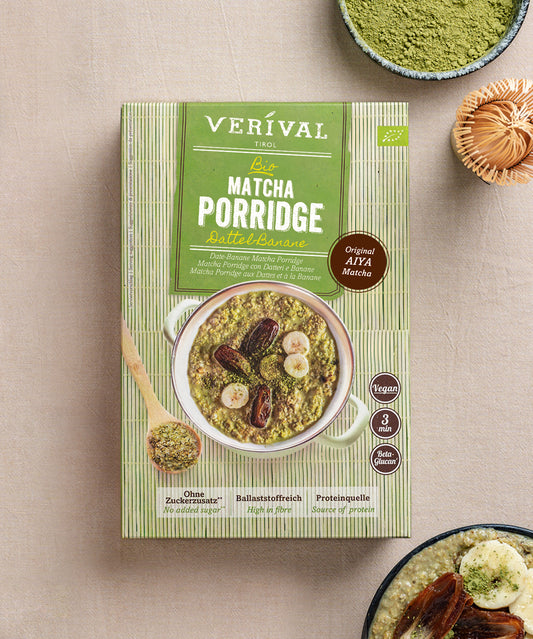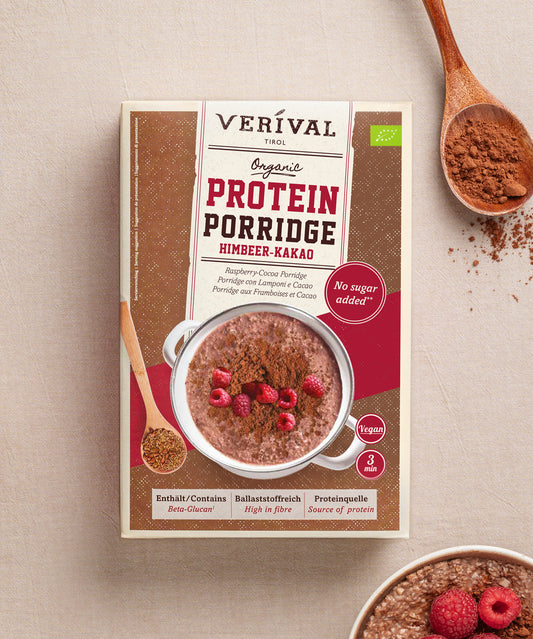Heartburn is annoying – plain and simple. It burns in your chest, sometimes rises up into your throat and can ruin your whole day or night. Anyone who experiences it regularly knows that not every food is good for your stomach. But you are not helplessly at its mercy. With the right diet, you can specifically alleviate and even prevent the symptoms. In this article, you will get a comprehensive overview of what you can eat for heartburn – and what you should avoid. You will also learn how heartburn develops, what it does to your body and how you can adjust your daily routine accordingly.
Prebiotic breakfast – our Verival promise for your gut!
What exactly is heartburn?
Heartburn usually feels like a burning pain behind the breastbone. It can also be accompanied by acid reflux, a feeling of pressure in the upper abdomen or a lump in the throat. Sometimes heartburn only occurs after eating, while others experience it particularly at night or when lying down.
What many people don't know is that coughing, hoarseness or a bad taste in the mouth can also be signs of heartburn.
Why does it happen in the first place?
The cause is almost always a reflux of stomach acid into the oesophagus – the technical term for this is reflux. The oesophagus is not designed to deal with acid. The stomach, on the other hand, has a protective layer. So when stomach acid rises, it irritates the sensitive lining of the oesophagus and causes this unpleasant burning sensation. This often happens when the sphincter muscle between the stomach and oesophagus does not work properly – for example, due to obesity, certain foods, medication or stress. However, poor posture after eating can also contribute to reflux.
Heartburn: How the burning sensation in your stomach develops!
Your stomach constantly produces stomach acid – and that's not a bad thing. On the contrary: without it, you wouldn't be able to digest food properly. The acid breaks down proteins, kills bacteria and makes many nutrients accessible. To prevent this aggressive fluid from entering the oesophagus, there is the lower oesophageal sphincter – a sphincter muscle that functions like a valve.
When the sphincter muscle no longer seals properly
Problems arise when this muscle no longer closes reliably. Then stomach acid flows upwards. This happens particularly often after large, fatty meals or if you lie down immediately after eating. Tight clothing, too much pressure on the abdomen (e.g. due to obesity or pregnancy), alcohol or certain medications such as painkillers and antidepressants can also weaken the sphincter muscle. And the longer the stomach acid remains in the oesophagus, the stronger the irritation. This is exactly what causes the burning pain.
Heartburn as a disease – what you can do
Occasional heartburn is no cause for panic. Many people experience it after a fatty meal or too much coffee. However, if the symptoms occur regularly – several times a week or even daily – you should take it seriously. In this case, it is referred to as reflux disease (GERD = gastroesophageal reflux disease), which can lead to permanent damage to the oesophagus if left untreated.
The right way to deal with heartburn in everyday life
You don't have to resort to medication right away. A lot can be achieved through a change in diet, more exercise and less stress. It is important to know your triggers – i.e. which foods or habits cause heartburn. Smaller meals, sitting upright after eating and raising the head of your bed slightly can also help. If the heartburn persists despite these changes, you should consult a doctor.
Basic principles of a diet for heartburn
Large meals put strain on the stomach. It expands, produces more acid and the pressure on the sphincter increases. As a result, stomach acid can rise more easily. Therefore, if you suffer from heartburn, it is better to eat smaller portions throughout the day. Three moderate main meals plus one or two small snacks in between – that's all you need. And don't eat too late! There should be at least two to three hours between your last meal and bedtime.
Prepare your food gently, avoid acid
What you eat is important – but how you prepare it also makes a big difference. Avoid frying, deep-frying or strongly spiced foods. Steamed, boiled or lightly stewed food is much easier on the stomach. You should also avoid highly acid-forming foods, such as coffee, alcohol, hot spices, citrus fruits, tomato products, chocolate and carbonated drinks. Instead, you need alkaline-forming, mild foods that do not further stimulate stomach acid.
Verival Porridge – the classic breakfast!
Foods you should eat if you suffer from heartburn
Here's the good news: you don't have to go without, you just have to choose wisely. There are many delicious, healthy and easily digestible foods that can calm your stomach and prevent reflux.
Cereals & carbohydrates – the gentle basis
Complex carbohydrates bind excess stomach acid and are easily digestible. Particularly recommended:
- Oatmeal – best cooked in water or plant-based milk, as porridge or overnight oats.
- Rice & millet – easily digestible, alkalising, good as a side dish or in vegetable stir-fries.
- Spelt & wholemeal bread without sourdough – provides fibre that stimulates digestion without irritating.
- Potatoes & sweet potatoes – alkalising, filling and versatile.
Mild vegetables – cooked instead of raw
Raw food is often difficult to digest and can aggravate heartburn. Better: steamed or cooked vegetables.
- Zucchini & carrots – mild, easy on the stomach, rich in vitamins.
- Pumpkin & fennel – calm the stomach, have an anti-inflammatory effect.
- Broccoli (steamed) – provides many nutrients, easily digestible in small quantities.
- Sweet potatoes – contain resistant starch, which protects the stomach lining.
Fruit – sweet, ripe and easy on the stomach
Not all fruit is suitable for heartburn. Avoid citrus fruits, pineapple and unripe fruit at all costs – they are too acidic. Instead, opt for the following varieties:
- Bananas – soft, alkaline, soothing for the mucous membranes.
- Ripe pears & peeled apples – sweet and easily digestible.
- Blueberries – antioxidant and stomach-friendly.
- Melon (e.g. honeydew or watermelon) – refreshing, high in water content, mild.
- Apple sauce (unsweetened) – a good choice, especially for acute symptoms.
Tip: If you want to be on the safe side, steam the fruit lightly. This makes it even more digestible.
Milk alternatives & protein sources – animal-based or plant-based
Milk products are not bad per se, but they promote acid production in many people. It is therefore better to choose:
- Plant-based alternatives such as oat, almond or rice milk – unsweetened and without additives.
- Tofu – a mild, plant-based source of protein that can be prepared in many different ways.
- Cottage cheese (in small quantities) – provides protein but is less fatty than many other dairy products.
- Cooked eggs – hard-boiled or poached are better than fried or prepared with fat.
Avoid cream, fatty cheese, yoghurt with added fruit and highly processed dairy products – they promote acid production.
Fats & oils – in moderation, but high quality
Fat slows down gastric emptying, which can promote heartburn. But you still need them, just the right ones:
- Linseed oil, rapeseed oil & olive oil – well tolerated in small amounts, best used cold.
- Avocado – contains healthy fats and can be included in your diet regularly if well tolerated.
Avoid fried foods, mayonnaise, butter in large quantities and anything with hidden trans fats.
Drinks – hydrating but acid-free
The right fluids help against heartburn – the wrong ones make it dramatically worse.
- Still mineralised water – neutralises acid and does not burden the stomach.
- Herbal teas – especially chamomile, fennel, lemon balm or aniseed soothe the stomach lining.
You should avoid these foods if you suffer from heartburn
Acid bombs and irritants
Some foods directly irritate the stomach lining or stimulate acid production. You should consistently eliminate these from your daily diet:
- Citrus fruits & tomato products – extremely acidic, irritate the oesophagus.
- Coffee and black tea – relax the sphincter muscle and promote reflux.
- Alcohol and carbonated drinks – irritate and cause bloating.
- Hot spices such as chilli, pepper and garlic – irritate the mucous membranes.
- Fried foods, fast food and fatty meat – slow to digest and heavy on the stomach.
Sweets & processed foods
Many processed foods also promote heartburn – often due to sugar, fat or hidden additives:
- Chocolate & sweets – contain fat, sugar and caffeine.
- Ready meals, crisps, snacks – lots of hidden fats, spices and acids.
- Cream, butter, cheese (especially hard cheese) – extremely high in fat.
- Baked goods with a lot of sugar or fat – especially puff pastry, croissants, cakes.
Basic rule: The shorter the list of ingredients and the more natural the food, the better it is tolerated.
Breakfast for heartburn – the perfect start to the day
Your stomach wakes up in the morning just like you do – so don't overwhelm it with a heavy meal right away. A light, easily digestible breakfast provides energy and is gentle on the stomach lining. High-fibre, low-fat foods with complex carbohydrates, some protein and little sugar are ideal. Avoid bread rolls with butter and cheese, fatty croissants or sweet pastries.
Instead, opt for mild cereals, cooked fruit and easily digestible milk alternatives. Your drinking habits also play a role in the morning: avoid coffee, citrus juice or cold drinks immediately after getting up – they irritate the stomach lining straight away.
Timing and posture are important
It is better to eat more slowly in the morning and take your time. Stress, hectic rushes or eating breakfast on the go often lead to hasty swallowing and air in the stomach – which increases pressure and promotes heartburn. Stay upright for 15 to 30 minutes after eating – don't go straight back to bed or the sofa. Here, too, the rule is: better to eat small, structured portions than an XXL breakfast all at once.
Breakfast ideas for heartburn
Here are a few simple, effective breakfast combinations that won't irritate your stomach:
- Oatmeal porridge with oat milk
- Cooked with water or oat milk, served with ripe banana, a little apple sauce and a spoonful of flaxseed – warm, soothing and filling.
- Wholemeal toast without sourdough with avocado (in moderation)
- Dünn bestrichen, mit Fenchelscheiben oder gedünstetem Zucchini belegt – mild und nährstoffreich.
- Boiled egg with millet porridge
- Millet provides iron and is easy to digest. Combined with a hard-boiled egg, it's a balanced combination.
Sweet breakfast – but low in acid
If you prefer something sweet in the morning, make sure to keep the sugar content low and the acidity to a minimum:
- Overnight oats with almond milk, blueberries & ripe pear pieces
- Soaked overnight, ready to eat in the morning – delicious, practical and easy to digest.
- Spelt bread with apple sauce (unsweetened) and cottage cheese
- An unusual but very easily digestible combination that tastes sweet but is gentle on the stomach.
Extra tip: A lukewarm chamomile or fennel tea rounds off your breakfast and helps your stomach start the day calmly.
Discover and celebrate the entire Verival breakfast range here!
Conclusion: Which foods are good for heartburn?
Heartburn is annoying, but it's not inevitable. With the right diet, you can noticeably relieve the symptoms – without medication. The key is knowing which foods are good for your body and which ones irritate it. Complex carbohydrates, mild vegetables, ripe fruit and selected fats form the basis of a healthy diet.
Make sure you eat small portions, prepare your food gently and take enough breaks between meals. Avoid highly acidic, fatty or heavily processed products – especially at breakfast. Starting the day gently often means you're already halfway to a calm stomach. And best of all, the change doesn't mean giving up enjoyment, but gives you more well-being. It's in your hands – every day.
























